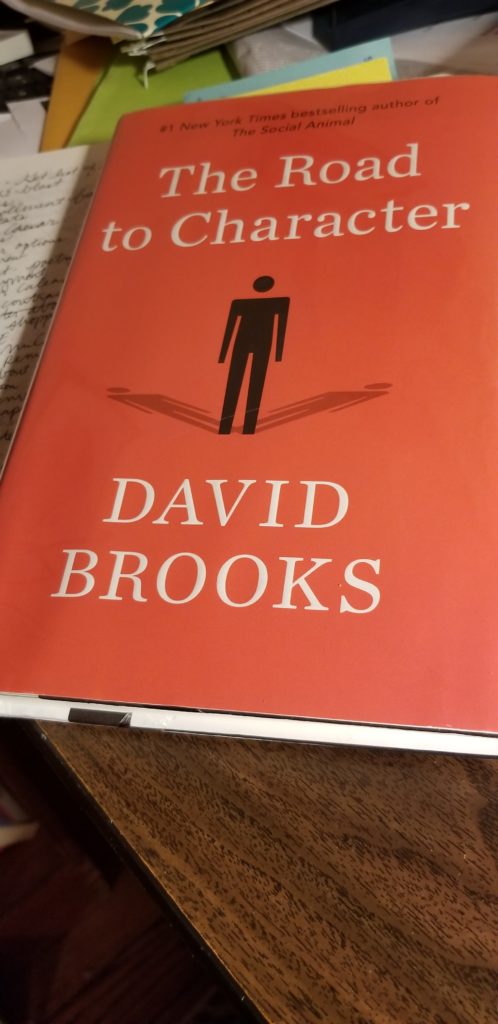I’ve started reading David Brooks’ The Road to Character. The road to the start of reading the book had many unexpected turns, as each time I’d bring it home in the library book haul, it would inevitably be returned to the library by my well-meaning husband. Our system of library returns is basically “find anything with a cellophane cover and take it back in hopes we’ll meet quota.” But this time, the book is on my desk and is more likely to survive an entire reading before returning to its home.
In the first chapter, Brooks examines the “commencement speaker” school of thought as to how we should tell The Youth to proceed with the stages of their lives in a trajectory towards greater fulfillment and, presumably, achievement.
By this way of thinking, life can be organized like a business plan. First you take an inventory of your gifts and passions. Then you set goals and come up with some metrics to organize your progress toward those goals. Then you map out a strategy to achieve your purpose . . . If you define a realistic purpose early on and execute your strategy flexibly, you will wind up leading a purposeful life.
David Brooks, The Road to Character – “The Summoned Self”
Spoilers: this is maybe not the approach that Brooks will recommend in the book. He goes on to discuss our emphasis on individual choices and autonomy, and how this can stand in the way of looking to see what we are called to do. Although he (so far) is not coming at this from the perspective of a particular faith tradition, it is easy to see how this integrates with the Christian concept of vocation.
We are thinking a good bit about trajectories and vocations in this household, in which two high school students reside. It’s one of my favorite (and probably least helpful, helicopter-wise) obsessions. We are trying to strongly push back against the idea that you can do anything you want and the most important thing is to be true to yourself and your awesome purpose. It’s so easy to slide from that idea over to “therefore, when you encounter suffering or confusion about your direction in life, it simply reflects a failure to successfully execute the right strategies for fulfilling your purpose.”
I am involved with our parish high school faith formation this year, and I really like that our youth minister has emphasized repeatedly that life is going to be really hard, at least some of the time, and you need to be ready to unite that suffering to Christ and not despair. That doesn’t sound exactly like a cheerful theme for awesome! youth! but does have the advantage of being real. High school kids know that suffering happens. Even if it hasn’t happened to them yet, they can look around and see among their peers that things hit the wall at some point and life gets rough.
I was speaking with a student (not in my household) today about the race to the top of the class at his high school and the fact that many of his classmates are obsessed with class rank. I don’t know if it’s worse in Texas than in other states, but the fact that those in the top 10% gain automatic admittance to all state-funded universities means that there is a lot of pressure on students to achieve this coveted status. It seems pretty common for students to compete to one-up each other in the rigor of how many AP classes can be shoved into a four-year-plan (to help with weighted averages).
It strikes me that this is pretty antithetical to education for its own sake or to discernment of one’s vocation. I do understand how important it is (especially for a high-ability, driven student) to plan out high school coursework that will be challenging and will prepare the child well for university admission. My current impression is that this pressure cooker is on highest temp (is that how pressure cookers work? I don’t actually know how to use my Instant Pot) for high school juniors, because this is the year you’re really building a transcript, starting to think seriously about college choices, etc. And in many school settings, these kids are competing with one another for the top spots at a time when it would most benefit them to start forming friendships based on a shared love of an educational pursuit.
Anyway – this is what’s on my mind so far; not sure how this relates back to Brooks’ point other than to say: It’s hard to be a high school student and more so if you’re not sure how to discern your calling or narrow down your interests.

